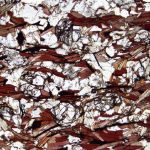An Indonesian man is recovering in hospital after trying to capture a 26ft python with a sack. Robert Nababan, a security guard known locally as a snake catcher, encountered the reptile as he was riding home from work on his motorcycle from a palm oil plantation in Riau province. Although there were two other people trying to cross the same ... Read More »
Science
Methane made lakes on Mars, says new research
Mars may have stayed warm enough for liquid water during its drying time thanks to bursting methane bubbles. According to scientists at the University of Chicago, their simulation suggests such a scenario could have possibly released enough of the potent greenhouse gas to keep Mars warmer for a tad longer before it succumbed to its inevitable barren state we all ... Read More »
Canadarm2 gets a new hand (Details)
Canadarm2 will be getting a new “hand” during a spacewalk scheduled for October 5, 2017. After 16 years of tireless work on board the International Space Station (ISS), one of Canadarm2’s Latching End Effectors (LEEs) will be replaced as a result of normal wear and tear. The Canadian Space Agency (CSA) and NASA have decided to replace the LEE to ... Read More »
Researchers get to grips with a new Jurassic crocodile
British waters are reassuringly free of deadly reptiles today – but 163 million years ago a sea crocodile dubbed the ‘Melksham monster’ lurked on our shores. The new species was a 10-foot-long animal that lived in the warm, shallow seas that covered much of what is now Europe. Powerful jaws and big, serrated teeth allowed it to feed on large ... Read More »
New Laser technique to detect explosives, says new research
University of Michigan researchers have developed a new laser-based spectroscopic method for identifying potentially dangerous gasses. The method, which relies on the combination of two spectroscopic techniques, could be used to more quickly and accurately identify explosives and other dangerous substances. This method could be used in systems placed in airports, for the environmental monitoring of pollutants or even in ... Read More »
Researchers Underestimated How Bad Cow Farts Are
Researchers have underestimated just how much livestock feces and gas have contributed to global warming, a new study contends. Scientists from the Joint Global Change Research Institute (JGCRI) found that global livestock methane (CH4) emissions for 2011 are 11% higher than the estimates based on guidelines provided by the Intergovernmental Panel on Climate Change (IPCC) in 2006. This encompasses an ... Read More »
Some sharks and rays live twice as long as we thought, finds new research
Sharks and rays are among the most intensely studied marine wildlife. For some reason, though, we seem to have vastly underestimated their lifespan. According to an Australian researcher from James Cook University, some sharks and rays can live twice as long as previously estimated. Scientists looked at 53 different populations of sharks and rays that scientists had already intensely studied. ... Read More »
Picture: ESA unveils last surprise from Rosetta
Researchers analysing the final telemetry sent by Rosetta immediately before it shut down on the surface of the comet last year have reconstructed one last image of its touchdown site. After more than 12 years in space, and two years following Comet 67P/Churyumov–Gerasimenko as they orbited the Sun, Rosetta’s historic mission concluded on 30 September with the spacecraft descending onto ... Read More »
Meteorites may have helped seed life on Earth, finds new research
The environment needed for life to be kickstarted on Earth may have been created by meteorites splashing into ponds of water, say scientists at McMaster University and the Max Planck Institute in Germany. Their calculations suggest that wet and dry cycles bonded basic molecular building blocks in the ponds’ nutrient-rich broth into self-replicating RNA molecules that constituted the first genetic ... Read More »
Scientists Find Signs of Life in 4 Billion-Year-Old Rocks (Research)
Life on Earth really did begin around 4 billion years ago – increasing the chances it could be abundant throughout the universe, according to new research. Graphite found in sedimentary rocks in Labrador revealed that the geochemical signature came from the decomposition of living organisms, researchers from the University of Tokyo said. The substance – a form of carbon used ... Read More »
Is this how Earth formed? Our planet may have created by the evaporation molten rocks
Analysing a mixture of earth samples and meteorites, researchers from the University of Bristol have shed new light on the sequence of events that led to the creation of the planets Earth and Mars. Planets grow by a process of accretion – a gradual accumulation of additional material – in which they collisionally combine with their neighbours. This is often ... Read More »
 Canada Journal – News of the World Articles and videos to bring you the biggest Canadian news stories from across the country every day
Canada Journal – News of the World Articles and videos to bring you the biggest Canadian news stories from across the country every day










